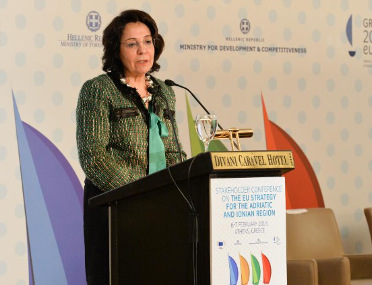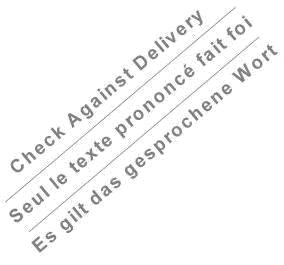A New Agenda for the Adriatic-Ionian

After attending the meeting of the Foreign Affairs Ministers of the Adriatic and Ionian Council, Commissioner Damanaki adressed on February 6th the Stakeholder Conference on the European Union's Strategy on the Adtiatic-Ionian Region (EUSAIR). Co-hosted by the European Commission and the Greek Presidency, the 2-day conference brings to an end the official consultation and opens the way for the Commission to draft the EU's third macro-regional strategy by June. The strategy will involve 8 countries : Greece, Italy, Slovenia and Italy as well as non-EU members Serbia, Montenegro, Albania, Bosnia and Herzegovina.
Read Commissioner Damanaki's speech below.

A New Agenda for the Adriatic-Ionian
Dear President, Ministers, Ladies and Gentlemen,
It is a great pleasure to be here and meet so many people who are working for the prosperity of the Adriatic and Ionian Region.
As Commissioner Hahn explained, the benefits of regional cooperation are exponential and there is a lot that can be achieved.
A substantial part of the potential for growth concerns the activities on our seas and coasts and that is why the maritime areas are an important part of the Adriatic Ionian Strategy.
The Adriatic Ionian macro-region generates every year an output of more than 20 billion euro of Gross Value Added and employs over half a million people in sectors of the blue economy.
And its nations clearly share the will to address the region's challenges together: since 2007 there have been 135 projects of cooperation on marine and maritime issues, worth almost half a billion in total.
(A precious amount of know-how and networking capital is building up. I am happy to see that there is a clear convergence on the need to work together on sustainable growth, for the region and for its citizens.)
Albania, Bosnia-Herzegovina, Croatia, Greece, Italy, Montenegro, Serbia and Slovenia have worked together and with our help have devised a comprehensive maritime strategy. On that basis we are now building an Action Plan for the Adriatic and Ionian Region.
Over the last four months, many of you have taken part in the consultations and provided key inputs to this Action Plan.
The way to go is quite clear.
In line with our Blue Growth strategy, we need to focus on areas where we think there are opportunities to seize /and provide the best possible operational conditions for businesses.
We need to give those promising sectors easier access to finance; better research and innovation capacity; less obstacles to grow; and a workforce that is skilled and qualified not only for today's, but also for tomorrow's technology. This is the Commission's effort.
Let me give you some examples.
We need to invest in research and innovation. This macro-region is already at the forefront in robotics for ocean observation and exploration. Nothing stops it from pioneering also the research of marine bioactive compounds for pharmaceutical and cosmetics purposes; or from developing deep-water floating platforms for offshore wind turbines, or new technologies for switching from diesel to electric vessels. These technologies are part and parcel of blue growth and are capable of pushing the technological frontier very far, very fast.
Then there is Tourism, by far the largest activity and the biggest promise of the region's coastal economy. Yes, the sector is booming despite the crisis, the “Arab Spring” and the Costa Concordia disaster. But how shall we keep the momentum?
The market for tourism is changing. Beaches are still busy, but today holiday makers want new, unique experiences alongside the sun-and-beach constant. They want a range of activities to choose from; they want top-notch service in clean and pristine resorts; they want to taste new experiences and an offer customized to their interests… and they want all this at an attractive price!
On a different front, the shortcomings of our fisheries system are well known, although EU countries are making a huge step forward with the Reform of the Common Fisheries Policy.
The management plan for small pelagic stocks in the Adriatic was good news last year. Now we need to make sure it is properly implemented by all. Only, if everybody plays by the same set of rules can we guarantee a level-playing field for our fishermen, restore the state of the stocks and improve the competitiveness of our fisheries sector.
This is the moment to use efficiently the new EU Funds: anticipate customer demand, improve mobility, improve service and offer all-year-round solutions.
The need for better transport connections is clear, and not just for tourism. I should add that whether for short-sea shipping or for energy transport, connectivity goes hand in hand with security.
The first step towards security is awareness. If surveillance and monitoring are done right, not only will we be safer – we will also free up money for investments elsewhere. So I encourage you to keep up the good work done to integrate and share data in the framework of ADRIREP. A part of our effort for CISE for maritime surveillance.
The security issue leads me to make another point. There is a key requirement for preparedness and an effective response in case of natural disasters in the Adriatic-Ionian region.
The European Commission together with the EU Member States are developing ways and means for enhanced communication and cooperation among civil protection and security-relevant authorities throughout the EU. This will be one of our proposals for a framework maritime security strategy. We would like to see this extended to the Adriatic-Ionian context.
We need it as the recent earthquake in Cephalonia proved. To return to this disaster, beyond the EU Solidarity Fund compensation possibilities, which is under the responsibility of my fellow Commissioner Johannes Hahn, I would like to point out that the new European Maritime and Fisheries Fund foresees the possibility of financing the reconstruction of fishing ports and other relevant infrastructure or equipment. We will explore with a sense of urgency the applicability of this instrument in the case of Cephalonia.
Ladies and Gentlemen,
At the EU level we are doing our bit by identifying bottlenecks and proper incentives for the most promising sectors and by opening up funding opportunities for the next seven years. We have also put forward a legislative proposal on Maritime Spatial Planning, which will help our countries do their maritime investment planning in a context of legal and environmental certainty.
It will be up to individual countries, regions and maritime stakeholders to follow this up with concrete projects. And this is precisely what we expect from you at this gathering. The only condition is that your suggestions are driven by sustainability.
We hope that by the end of tomorrow we can agree on a series of concrete proposals which push your macro-regional project forward; and which make a real difference in terms of economic prosperity.
I wish this conference and the Adriatic and Ionian region every success.


